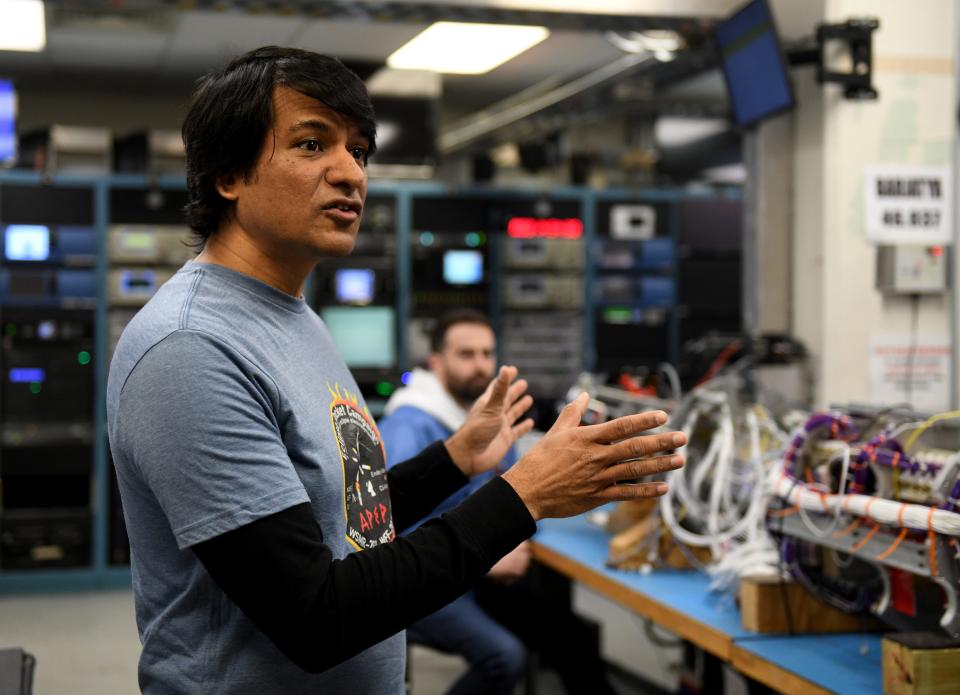Space Force, Rocket Lab set new partnership that includes big Virginia launch
Rocket Lab USA, Inc. announced Monday it has been awarded a $14.49 million task order by the U.S. Space Force to launch an Electron mission from Launch Complex 2 at the Wallops Flight Facility.
The mission, called Space Test Program-30, falls under the Space Systems Command Assured Access to Space organization and is part of the Orbital Services Program-4.
The dedicated Electron launch is scheduled to take place within 24 months from contract award and will lift off from Launch Complex 2, a dedicated pad for the Electron rocket at Virginia Spaceport Authority’s Mid-Atlantic Regional Spaceport within the NASA Wallops Flight Facility on Virginia’s Eastern Shore.
More on the recent eclipse NASA releases stunning solar eclipse 2024 photos. See them here.
'Flexible, responsive, and reliable' launches at Wallops

"Flexible, responsive and reliable launch is critical to ensuring resilient space capabilities for the nation, and we’re proud to deliver it to the Space Force once again with Electron,” said Rocket Lab founder and CEO Peter Beck. “After more than 40 successful launches from pads spanning both hemispheres, we’ve delivered time and time again for the Department of Defense, national security and commercial space users alike."
The launch is a complex mission that will deliver research experiments and technology demonstrations to orbit for the United States Department of Defense and contribute to future space systems development. The projected primary payload will demonstrate sustained very low earth orbit flight and test a unique, 1-meter diameter, disk-shaped satellite bus that is designed to increase on-orbit persistence.
More on how Maryland saw the eclipse Solar eclipse 2024 and rocket launches combine for thrilling day at NASA Wallops: PHOTOS
Rocket Lab's Electron, Photon have become red-hot rockets
Rocket Lab’s Electron launch vehicle has become the second-most frequently launched U.S. rocket annually and has delivered 180+ satellites to orbit for private and public sector organizations, enabling operations in national security, scientific research, space debris mitigation, Earth observation, climate monitoring and communications. Rocket Lab’s Photon spacecraft platform has been selected to support NASA missions to the moon and Mars, as well as the first private commercial mission to Venus.
Rocket Lab has three launch pads at two launch sites: Two launch pads at a private orbital launch site located in New Zealand and its third launch pad in Virginia.
According to the company, Rocket Lab has a long track record of delivering mission success for the USSF on Electron, including the successful launch of an Air Force Research Laboratory-sponsored demonstration satellite called Monolith in 2021, and the successful launch of the STP-27RD mission research and development satellites for the defense department in 2019.
"(This agreement) is cementing Electron’s position as the leading small launch solution globally. We’re excited to demonstrate this unique combination of mature proven execution, speed, and agility for Space Test Pprogram-30 mission,” Beck said.
Rocket Lab is also working closely with the space force for the development of the company’s new medium-lift vehicle Neutron through a $24.35 million contract with the space force to support development of Neutron's upper stage.
More on recent Rocket Lab launches Rocket Lab successfully launches Electron rocket from Wallops Flight Facility
This article originally appeared on Salisbury Daily Times: Here's what's ahead for Rocket Lab's Electron Photon, at Wallops

